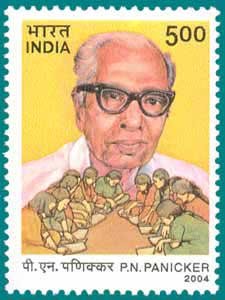P.N. Panicker – Reading Day

Technical Data
| Date of Issue | June 19, 2004 |
|---|---|
| Denomination | Rs. 5 |
| Quantity | 400,000 |
| Printer | Security Printing Press, Nashik |
| Watermark | No Watermark |
| Colors | Multicolor |
| Catalog Codes |
Michel IN 2028 Stamp Number IN 2064 Yvert et Tellier IN 1793 Stanley Gibbons IN 2206 WADP Numbering System - WNS IN014.04 |
| Themes | Education | Famous people | Men | Optical Instruments | Reformers |
Table of Contents
P.N. Panicker: The Architect of Literacy in Kerala
P.N. Panicker was a legendary figure whose impact on education and literacy in Kerala resonates to this day. His life exemplified Ralph Waldo Emerson’s observation that “an institution is the lengthened shadow of one man.” A frail, khadi-clad elder, he left a monumental legacy that transformed Kerala into a model of literacy and development.
Early Life and Inspiration
Born on March 1, 1909, in Kuttanad, in the erstwhile Travancore state, Panicker’s interest in reading was evident from a young age. He not only read newspapers and books himself but also took it upon himself to read daily news to groups of illiterate individuals in his community. In a humble room provided by the local cooperative society, he established the Sanadanadharmam Library, which marked the beginning of a significant movement.
Inspired by Mahatma Gandhi, Panicker was deeply affected by the Mahatma’s assertion that “illiteracy is a curse and shame of the country,” fueling his mission to eradicate it.
The Library Movement
In 1945, Panicker founded the Kerala Grandhasala Sanghom (Kerala State Library Council), which ignited a cultural revolution in the state. What began with just 47 libraries blossomed into a vast network of over 6,000 libraries, reaching even the most remote and neglected tribal areas. To further enhance this initiative, he organized the Kerala Association for Non-Formal Education and Development (KANFED). Together, these organizations transformed the idea of library access into a widespread movement, significantly influencing Kerala’s educational landscape.
Achievements and Impact
Panicker’s tireless efforts and visionary leadership led to Kerala becoming the first fully literate state in India by 1991. The statewide campaign, known as Sakshara Keralam, was marked by the involvement of thousands of volunteers, culminating in the achievement of total literacy on April 18, 1991. Social historians credit the cultural revolution in Kerala, following the social emancipation movements led by figures like Sree Narayana Guru and Ayyankali, to the momentum generated by Panicker’s library movement.
Later Years and Legacy
Towards the end of his life, Panicker was troubled by the growing fissiparous tendencies in the country and dedicated his efforts to promoting social harmony through the Friendship Village Movement (Sauhrudagramam). His simple Gandhian lifestyle and unwavering determination drove him to continue his work until his passing on June 19, 1955.
In recognition of his contributions to literacy and education, the Government of Kerala observes June 19 annually as Vayanandinam (Day of Reading), featuring a week-long series of activities in schools and public institutions. Panicker’s legacy has also inspired the National Literacy Mission, reflecting the power of his slogan, “Read and Grow,” which transformed into a potent movement for societal change.
Commemorative Recognition
To honor the immense contributions of P.N. Panicker, the Department of Posts has issued a commemorative postage stamp, celebrating the life and impact of this remarkable figure in Kerala’s history.
